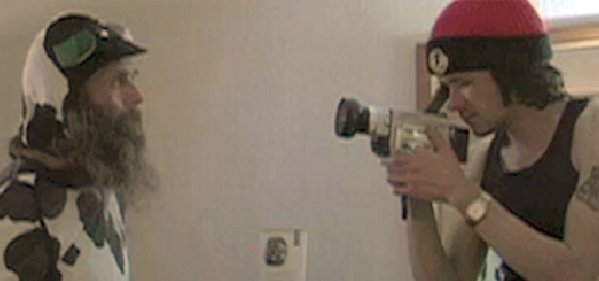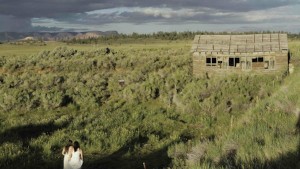Hey, Risk-Taking Filmmakers! There’s a New Distribution Company Looking for You
 This past summer, right around the time the Los Angeles Film Festival screened the US premiere of Adam Rifkin’s Giuseppe Makes a Movie, the quirkily beautiful doc about “trailer-park auteur” Giuseppe Andrews was picked up by Cinelicious Pics. That’s great news not only for Rifkin, but for independent filmmakers across the board—because Cinelicious (the newly launched distribution arm of the post-production/restoration company of the same name) is dedicated to releasing innovative and exciting work by risk-taking filmmakers. Proof is in the first batch of acquisitions. Along with Giuseppe, the company has picked up Ragnar Bragason’s Metalhead, Elena Tikhonova and Dominik Spritzendorfer’s documentary Elektro Moskva, Josephine Decker’s Butter on the Latch and Thou Wast Mild and Lovely and Anurag Kashyap’s five and a half hour Indian crime epic Gangs of Wassypur. The distributor plans on releasing an eclectic mix of new American and foreign independent features and documentaries each year.
This past summer, right around the time the Los Angeles Film Festival screened the US premiere of Adam Rifkin’s Giuseppe Makes a Movie, the quirkily beautiful doc about “trailer-park auteur” Giuseppe Andrews was picked up by Cinelicious Pics. That’s great news not only for Rifkin, but for independent filmmakers across the board—because Cinelicious (the newly launched distribution arm of the post-production/restoration company of the same name) is dedicated to releasing innovative and exciting work by risk-taking filmmakers. Proof is in the first batch of acquisitions. Along with Giuseppe, the company has picked up Ragnar Bragason’s Metalhead, Elena Tikhonova and Dominik Spritzendorfer’s documentary Elektro Moskva, Josephine Decker’s Butter on the Latch and Thou Wast Mild and Lovely and Anurag Kashyap’s five and a half hour Indian crime epic Gangs of Wassypur. The distributor plans on releasing an eclectic mix of new American and foreign independent features and documentaries each year.
We talked to film restoration expert Paul Korver and ex-American Cinematheque head programmer Dennis Bartok, who are at the helm of Cinelicious, about what they’re looking for from independent filmmakers.
Tell us about your approach to selecting and distributing films.
Bartok: I love the theatrical experience. We firmly believe that we want all the movies we pick up to be put out theatrically first, followed by VOD and DVD and Blu-Ray and TV. I have a lot of contacts with filmmakers. Giuseppe Makes a Movie came about because I’ve been friends with Adam almost 20 years going back to our relationship at American Cinematheque, so I can email him directly and say hey we’re staring distribution company and I would love to see your doc. He got back to me right away. We watched it and loved it and we were off and running.
When I was watching Giuseppe for the first time, half way through the movie I stopped it and said, ‘I hope to God this was not scripted’—that it’s not a faux documentary, because it is so brilliantly funny and jaw-droppingly strange and also very heartfelt and touching in a strange island of misfit toys way’. [The doc’s subject Giuseppe has made 30 feature films starring his trailer park neighbors and homeless friends.] The subsequent history of the doc is that a lot of people have since died or dropped off the radar, [and it] shows that Giuseppe was kind of the glue holding them together and it was really important in their lives, even though nobody was seeing the films. He paid them all, but even more he gave value and validated their lives and their artistry. For me, [the] doc worked on a number of levels. It’s a strange subgenre of DIY docs, of people making movies… some of them are really funny but don’t go beyond “weird factor.”
What do you see as the biggest challenge facing independent filmmakers?
Korver: Finding the right partnerships and finding people who are really passionate about your film and willing to invest not just money and time but creative efforts in the release is the challenge. There’s a lot of talk of self-distribution for indie filmmakers. I think it’s really easy to get lost in VOD land, or thinking if you put your film up, you’re going to make money. I know what some of the numbers are. You need to have a team of passionate people around you, unless your film has some really unique characteristics that make it break out on its own. That seems to happen very rarely.
Bartok: There’s a big difference between success on the festival level than translating that into success theatrically. I think the bar is still relatively high to get theatrical bookers to take a chance on indie films, especially ones that may have picked up laurels that don’t have recognizable names attached or aren’t in a recognizable genre. It’s still tough to crack that art house market and it’s still dominated on the art house level by really savvy, well-established players like the Sony Classics and Magnolia and people like that. For us, our strategy is a combination of new independent and foreign features and documentaries that really push the envelope and selected restorations of lost films or foreign movies that haven’t been seen here for several decades. Coming from a background at Cinematheque, we showed new movies, we showed old movies… I didn’t really make a distinction. If it was great cinema, it was great cinema.
 What are you looking for when you look for independent features? Is there a magic formula that attracts you?
What are you looking for when you look for independent features? Is there a magic formula that attracts you?
Korver: For us, most of our films have an element of, like Giuseppe, being provocative. On the surface it’s this guy making these crazy movies with homeless people and crack addicts—that’s the provocative part—but there’s this whole other unexpected surprise part that’s this story of this family. And there’s really amazing heartfelt moments in the film that take it away from being just this kind of exploitative thing for shock value. That’s true of Metalhead too. Metalhead is a film from Iceland and the one-sheet and artwork make it seem like it’s this hard core metal movie, yet there’s these amazing themes of redemption and loss and reconciliation.
Bartok: I love music and really respond to films that have, what I call, a rock and roll sensibility. Four of the new movies we’re distributing have a killer musical vibe. Giuseppe uses his own DIY Daniel Johnston style music in the soundtrack. Elektro Moskva, which is a documentary by a pair of Russian filmmakers about the secret history of soviet space age electronic music, is just wall-to-wall electronic music from behind the iron curtain. Metalhead, as the title implies, has got an amazing soundtrack of late ‘80s/early ‘90s head-banging classics and it’s about a young woman whose brother is killed in a farming accident and in her grief she adopts his metalhead persona and starts playing his Flying V guitar and howling anthems of rage to a barn full of cows. Even Gangs of Wassypur, in some ways, is a kind of anti-Bollywood film in that it does not have huge choreographed dance sequences when the action stops and everybody starts lip-synching, and yet it has an amazing soundtrack. But the director, Anurag Kashyap, found a way to work it into the fabric of the drama so there will be a dramatic scene happening in the foreground and in the background, there will be a street singer at an Indian wedding, singing this amazing dance pop song. I like films that have a really great musical vibe, that is one of the elements that gets us excited.
Korver: For Josephine’s films, it’s her voice. It’s the freshness of what she’s bringing.
 Bartok: When I was programming at Cinematheque, I had to watch a lot of films from all over the world in languages I didn’t speak and a lot of times they would send me screeners without subtitles, and I had to watch movies from Spain or Croatia or Japan. I learned that within five minutes I could tell if a movie was a great film, if the director knew how to use the camera in a really kinetic way, if the actors had authenticity on screen. I think film, at heart, really is still a visual medium. The first features we’re putting out are all intensely visual and very pleasurable experiences, I’ve seen a lot of films at Sundance and at various other festivals and you watch them once and go, ‘Wow, this was a really unique powerful film, but I never want to watch this again’. Simply because the film doesn’t lie beautifully on your eyes. It’s not a movie you want to revisit again and again and again. That’s the quality of a great film: you should want to go back to it. Whether it’s a filmmaker like Nicolas Roeg or David Lynch or Ken Russell, their movies always revealed something each time you watched them. That’s something I really encourage independent filmmakers today to think about, making movies that people would want to watch again and again. It’s also the hallmark of a great album. You don’t listen it just once and say ‘Yeah, Sgt. Peppers was great. I never need to listen to it again’. You want to listen to it 20 times or 30 times.
Bartok: When I was programming at Cinematheque, I had to watch a lot of films from all over the world in languages I didn’t speak and a lot of times they would send me screeners without subtitles, and I had to watch movies from Spain or Croatia or Japan. I learned that within five minutes I could tell if a movie was a great film, if the director knew how to use the camera in a really kinetic way, if the actors had authenticity on screen. I think film, at heart, really is still a visual medium. The first features we’re putting out are all intensely visual and very pleasurable experiences, I’ve seen a lot of films at Sundance and at various other festivals and you watch them once and go, ‘Wow, this was a really unique powerful film, but I never want to watch this again’. Simply because the film doesn’t lie beautifully on your eyes. It’s not a movie you want to revisit again and again and again. That’s the quality of a great film: you should want to go back to it. Whether it’s a filmmaker like Nicolas Roeg or David Lynch or Ken Russell, their movies always revealed something each time you watched them. That’s something I really encourage independent filmmakers today to think about, making movies that people would want to watch again and again. It’s also the hallmark of a great album. You don’t listen it just once and say ‘Yeah, Sgt. Peppers was great. I never need to listen to it again’. You want to listen to it 20 times or 30 times.
Korver: What filmmakers should be thinking about to set their films apart is to take risks, unless you’re playing straight to a genre and want to make an independent horror film. Taking risks that serve your story and how successful you are at achieving that determines your skill as a filmmaker. You need to take risks as an independent to create excitement about your language and your style of filmmaking. Josephine Decker’s films are very risky. Some people hate them. But a lot of people really respond. She could have made something a lot more easy to swallow and it probably would have gotten lost in the sea of other easy-to-swallow independent films.
Bartok: There’s something incredibly inspirational about Giuseppe Makes a Movie, I would screen it for first year film students. Giuseppe has made 30 feature films and dozens of shorts and most of his movies he’s made for $800-$1,000 total. He is an amazing example of someone who didn’t sit around for five years waiting to raise $500,000 or $800,000 or $1.5 million. He found the means and the inspiration and the hutzpah and he was making, at his peak, four or five features a year. They’re insane and very few people have seen them but he’s a great sample of somebody who’s really [just making work.]
A lot of the filmmakers who were considered to be the giants of yesteryear, John Ford or Hitchcock or filmmakers like that, their film school, their training ground was making a lot of films earlier in their careers. They were very prolific. By the time they became famous, they already had a significant filmography and they were able to make mistakes. Every one of the early Hitchcock films is great. They’re all fascinating and you can watch them and see how he was learning to become Hitchcock. The problem for filmmakers today is you get one shot. You raise your private equity from friends and family and you make an indie film and you hope it gets into Sundance and you hope it gets picked up by a major art house distributor and hope that it gets out there and gets seen, but you’re putting all your eggs in one basket. There’s a lot to be said for making a movie, putting your heart and soul into it, pushing it out there and then you’re already making another one and another one and another one. That’s how I think you become a great director.
What more should filmmakers know about Cinelicious?
Bartok: There’s a new distribution company out there that’s hungry for great movies and if there are indie filmmakers out there who feel they haven’t gotten a fair crack, ring us up. We’re always willing to look at material. We’re willing to look at a trailer, a feature link. We very much have an open door policy.
Pamela Miller / Website & Grants Manager